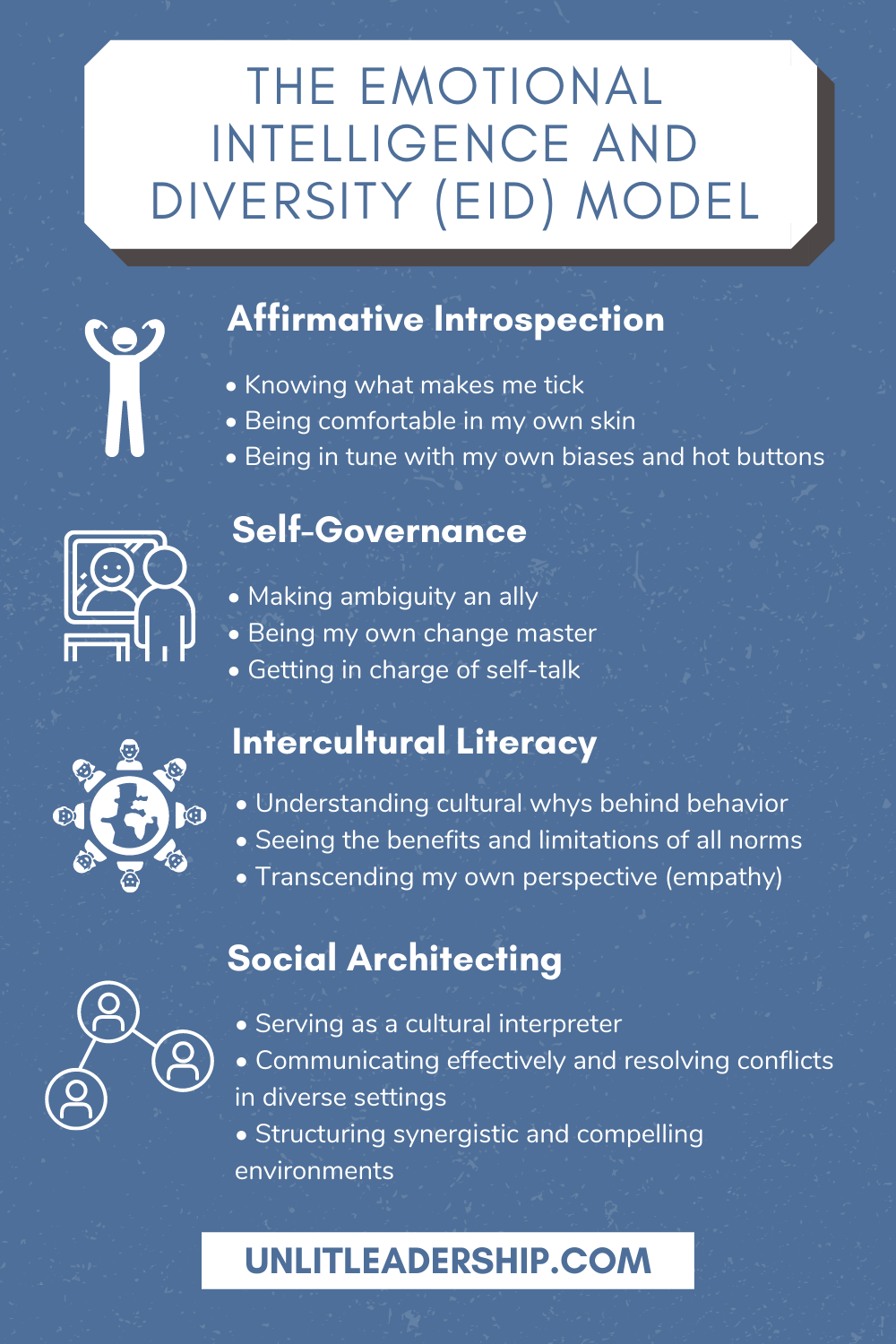Why do I focus so much on the concept of emotional intelligence or the emotion quotient (EQ)? Increasing your emotional intelligence and learning to harness EQ to better yourself, your team, and your organization is critical to your success as a diverse leader. However, for leaders to increase and capitalize on EQ, they must regularly focus on and practice specific habits.
EQ and Diversity
For the slightly different leader, whether it’s the young executive that’s ten years junior to the rest of his work peers, the one female programming lead amongst the group techies or one of the three minority leaders out the group of 100 leaders managing insurance firms. We must learn how to maximize our unique backgrounds, talents, and experiences to guide, influence, and motivate others.
Emotional intelligence is the diverse leader’s key to success in maximizing the potential of their team and their own. There are four critical aspects to harnessing the power of emotional intelligence for diverse leaders. These four steps are described in the Emotional Intelligence and Diversity (EID) Model and include:

So how does the emotionally intelligent leader improve their EQ? By consistently improving upon the EQ skills found within their leadership toolbox. This improvement requires leaders to practice certain habits regularly. Below are seven habits of emotionally intelligent leaders.
Unlit Leadership is a participant in the Amazon Services LLC Associates Program, an affiliate advertising program designed to provide a way for websites to earn advertising revenues by advertising and linking to Amazon.com. As an Amazon Associate, I earn from qualifying purchases.
1. Emotionally Intelligent leaders practice active listening
One of the most powerful tools in a diverse leader’s toolbox is active listening. The act of listening requires a leader to tune into the message that the speaker is conveying. Active listening allows you to comprehend the speaker’s thinking and inspiration more readily and better read their tone—which can assist you with interpreting their feelings and assess their needs.
Surprisingly active listening can be difficult for some leaders, especially in ad hoc conversations. Specifically, when a team member catches you while in the middle of an e-mail or a project, leaders are usually only half-listening while still trying to complete the task they were working on. Times like these can difficult for the leader to stop and give their undivided attention or ask the employee to come back at a better time. Author Michael Sorensen provides some great insight on how to master active listening in his book; I Hear You: The Surprisingly Simple Skill Behind Extraordinary Relationships.

2. Emotional intelligent leaders are patient and think before engaging
As a military leader, I try to impress upon junior leaders the importance of patience and taking the time to think about and evaluate all available information before commenting or giving a response. How many times have you responded before thinking something through? Only to later recant or rephrase your statement. Unfortunately, impatience overzealous reactions are all too common in the workplace and represent a leader who needs to increase their emotional intelligence.
As leaders, when our teams communicate with us and require our input, we must take the time to actively listen to all the information provided. This time allows us to screen and react to our feelings concerning what the team member has presented. The combination of active listening and patience allows the emotionally intelligent leader to respond and provide input objectively, utilizing all available information and placing aside personal bias.
3. Emotionally Intelligent leaders have empathy and compassion
For the vast majority of leaders, compassion and empathy are second nature. Great leaders care for their teams, and this care is demonstrated by how they communicate and interact with their employees. Those with a high EQ can feel or imagine another person’s emotional experience. Often, we think empathy involves grand gestures to show we care and understand how a person feels, but sometimes it’s the little things that help demonstrate to your team your level of compassion. For example, my director always purchases cards in my office and publicly recognizes vital milestones in our team members’ lives, whether personal such as birthdays or professional such as promotions. However, this type of sympathy doesn’t come easy for everyone.
On the other spectrum, some of us have to work a little harder to demonstrate compassion and empathy. I’ve mentioned in past blog articles that I am an ISTJ personality type, and a common trait among leaders with this personality type usually is focused on mission accomplishment. Unfortunately, this focus can sometimes be to the detriment of demonstrating and showing compassion and empathy. ISTJ personalities may sacrifice empathy for productivity if there is not a clear correlation to mission accomplishment. However, this is where emotionally intelligent leaders have an edge.
As a result of their increased self-awareness, emotionally intelligent leaders that may lack outward compassion and empathy will recognize this as one of their weaknesses and, in turn, work hard to strengthen this ability.
4. Emotionally intelligent leaders observe and interpret non-verbal communications
Most experienced leaders are aware of the famous researcher Albert Mehrabian who ascertains that 55% of communication is body language, 38% is the tone of voice, and 7% is spoken. Leaders with a high EQ understand the importance of non-verbal communications from their team members and themselves. As a result, leaders focus on interpreting and evaluating the non-verbal communication of their team members and how their team members respond to their nonverbal cues.
How many times have you known that something was bothering your significant other, but when you asked them, they responded with ”nothing.” I’ve found myself in this situation more times than I care to admit, but the same is true in the work environment. A team member may disclose that they’re okay with your decision or have no comments. However, their crossed arms and anxious handwringing may tell a different story. Leaders must improve their observation and non-verbal interpretation skills to communicate, influence effectively, and motivate their team.
5. Emotionally intelligent leaders journal for increased self-awareness
Self-awareness and emotional intelligence go hand and hand. Increasing your self-awareness also improves your overall EQ. Understanding yourself leads to knowing your various triggers, how you respond in different situations, and your strengths and weaknesses. Leaders should consistently self-assess to evaluate their strengths and weakness.
A method that some leaders use is journaling. Insightful leaders regularly annotate their thoughts, daily observations, goals, etc., in a journal. This practice serves a few purposes:
- Regular journaling allows the leader to get thoughts out of their head that may get buried throughout a leader’s busy day
- Regular journaling helps leaders refine and articulate ideas
- Regular journaling helps leaders self assess and improve upon weaknesses
For leaders that want to get started on journaling, a great place to start is an article by Nancy J. Adler for the Harvard Business Review titled. Want to Be an Outstanding Leader? Keep a Journal. Also, below are a couple of my favorite journals.
EVO Planner Daily Journal Non-Dated Weekly Monthly Gratitude Agenda – Happiness Goals Productivity (Quarterly 90-Day Planner)

Productivity Planner :Plan Out Your Daily & Long Term Goals and Become More Productive this Year | Simple Daily Format – Increase Self Awareness and Productivity with Researched Productivity Principles

SELF Journal by BestSelf — Undated 13-Week Planning, Productivity and Positivity System for Max Achievement and Goal Success — Track Gratitude, Habits and Goals Daily and Weekly

6. Emotionally Intelligent Leaders practice lifelong learning
Truly self-aware and emotionally intelligent leaders understand that they are seldom the smartest individuals in a room. However, not being the smartest person in the room shouldn’t stop us from consistently increasing our knowledge. Emotional intelligent leaders regularly gain knowledge by observing, learning, and interpreting information about themselves, those around them, and their environment.
A lifelong learner is not strictly formal education, though it may be one aspect. Life-long learning includes pursuing personal interests and passions, pursuing professional ambitions, increasing self-awareness and emotional intelligence. The key is that emotionally intelligent leaders are consistently learning.
7. Emotionally intelligent leaders build and foster relationships
Leadership is highly dependent on connections. Whether those connections are external or internal, personal or professional, a core leadership skill is relationship building. Fostering and building relationships is another area that where the emotionally intelligent leader excels. As I mention in this article, emotionally competent leaders will likely possess highly tuned listening skills, intrapersonal skills, and the ability to influence others. These three skills make up the foundation of building both personal and business relationships.
Though this skill usually comes easy for high EQ leaders, relationship building must be practiced and honed. As I mentioned above, high EQ leaders understand that they are lifelong learners, and there is always more to learn. I would suggest one of the most popular leadership books for leaders looking to improve their relationship building. How to Win Friends and Influence People, by Dale Carnegie, has become the standard for fostering relationships with over 30 million copies sold.

Conclusion
Leaders must consistently improve their emotional intelligence if their goal is to be truly effective leaders. Whether leaders are enhancing their self-awareness, fostering relationships, or journaling as a means is self-assess, leaders should incorporate habits focus on EQ. The habits, practices, and resources I’ve included are not all-inclusive, and I’m sure many leaders have suggestions for aspiring leaders. Feel free to drop your suggestions or comments down below.



